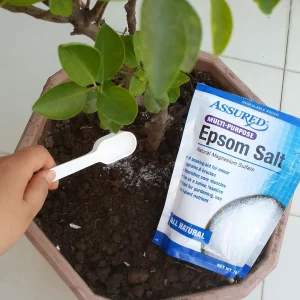Healthy root systems are crucial for plant development and nutrient absorption. Epsom salt can play a role in promoting robust root growth. The magnesium in Epsom salt encourages the production of enzymes that aid in root development, resulting in stronger, more extensive root systems. This, in turn, improves the overall health and resilience of your plants.
Preventing Nutrient Deficiencies:
Certain plants, such as tomatoes, roses, and peppers, are more prone to magnesium deficiency. Common signs include yellowing leaves with green veins. Epsom salt can be used as a foliar spray or soil amendment to supplement magnesium levels and prevent deficiencies. However, it’s important to conduct a soil test or consult a gardening expert to determine if your plants truly require additional magnesium.
Enhancing Plant Blooms:
Epsom salt is renowned for its ability to promote beautiful blooms in flowering plants. The magnesium component of Epsom salt aids in the production of chlorophyll, which is crucial for photosynthesis and energy production. When plants have sufficient magnesium, they can direct more energy towards flower and fruit production, resulting in more abundant and vibrant blooms.
Warding off Pests and Diseases:
Epsom salt can also help in deterring certain pests and diseases from your plants. It is believed to make plants less appealing to pests like slugs and snails, as well as discourage fungal diseases. However, it’s important to note that Epsom salt is not a cure-all solution for pest and disease control, and it should be used in conjunction with other integrated pest management practices.










